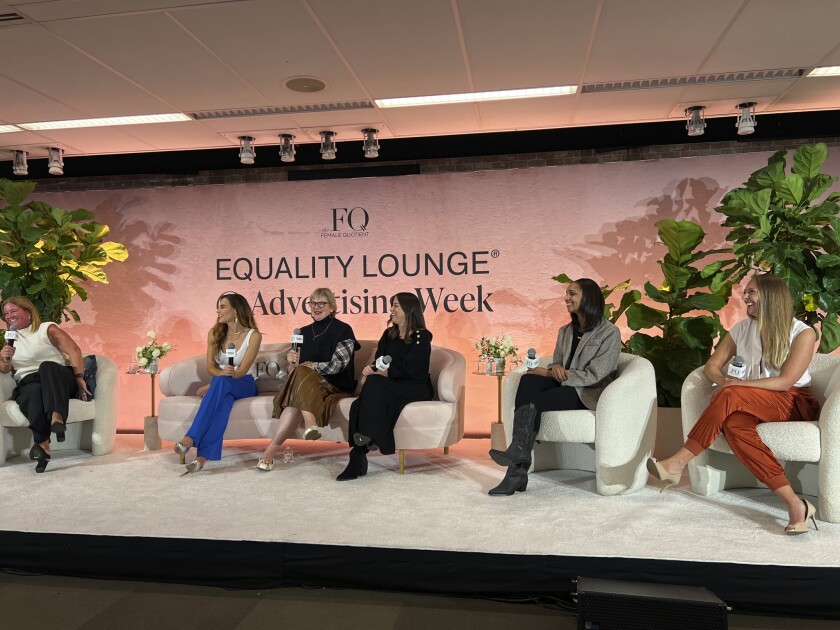Last week, we participated in Advertising Week New York (AWNY), an annual conference that unites the brightest minds in marketing, advertising, media and technology. The conference presented a remarkable opportunity for us to engage with industry experts and witness our own leaders and Board members address several pressing issues affecting the nation. Join us for a recap of AWNY, where we'll examine the key insights and creative innovations reshaping our industry, including the four pivotal themes that emerged.
Authenticity is a requirement for brands, not an option
Throughout the week, people from various industries spoke about the importance of creating an authentic brand that embodies an organization's core values and mission.
Our Chief Campaign Development Officer, Michelle Hillman, joined an inspiring panel discussion titled Unreasonable Impact: Creativity’s Role in Driving Real-World Change, featuring female leaders from Ogilvy and the ERA Coalition. This panel explored what it means to create real, measurable impact in marketing. During the session, Michelle shared insights on building trust as a brand and how authenticity can foster deeper connections with the audience.
“It goes back to simple, authentic ideas that are based on real human truths. I think that’s really where we see the best work and the best storytelling. There’s nothing that drives empathy more than telling a story where you’ve really put yourself into it.”
Another aspect of brand authenticity is managing all brand extensions to maintain a consistent brand voice throughout the organization. In the panel, Building Trust and Relevance with Conscientious Consumers, Christina Hanson, CEO of OMD USA and member of the Ad Council’s Board of Directors, highlighted the significance of commerce in establishing trust, loyalty and authenticity with consumers.
“Commerce is not a channel or a tactic—it's threaded through everything. That relevancy and reinvention to make it current today is only possible when you know your brand and what it stands for.”
The power of bringing new and creative thinking to the table

Our VP Group Campaign Director, Jenn Walters, discussed the importance of creativity in the workplace with speakers from Yahoo and Google, during the panel Work Hard, Play Harder: How Playfulness, Imagination & Creativity Give Companies a Competitive Edge. During the session, the panelists discussed ways for brands to foster internal creativity and create an environment conducive to open idea sharing.
“We value inclusivity and creating psychological safety so that people feel inspired to share their ‘bad ideas’ and encourage thinking in new and different ways. At the Ad Council, we have a process: open, explore, then narrow.”
Maintaining rigid creative processes can be detrimental to success, while fostering creative freedom, collaboration, and adaptability proves paramount. Abigail Posner, director of creative works at Google highlighted the creativity that lives within each of us, “All of us have an innate sense of creativity and if we tap that, especially with other people who want to collaborate with us, it is amazing what ideas can come forth.” Recognizing our inherent creative potential, it's crucial to value the perspectives of fellow creatives at the table. Ashley Champ, head of growth and creator partnerships at Blacktag, Inc. commented, “There are a lot of different people out there. You can no longer confine your focus to your organization's interests. To grow and scale, you have to take into consideration all perspectives.”
Evident from this panel, creativity is listed among the highest-valued skills among brands. From team bonding or instilling “Focus Fridays,” to prioritizing time to disconnect or communicating through Slack channels, each speaker shared how they foster a culture of creativity in the workplace.
Equality in the workplace has a long way to go
A common theme throughout AWNY was the ongoing issue of gender inequality in the workplace. While this topic is not new, industry leaders emphasized the importance of elevating this issue in our collective consciousness, underscoring how far women still have to go to break the metaphorical "glass ceiling"—a term referencing the barrier women confront when trying to advance in the workforce. Kathleen Hall, chief brand officer at Microsoft and Ad Council Board member, spoke on the level of advocacy needed to break this ceiling at a panel, License to Lead Differently: Female Leaders Reshaping Business & Driving Impact. She emphasized that speaking up for yourself is where the work begins.
“It’s a big ceiling that we have to break, still. I think a lot of it is self-advocacy. You have to be willing to say, ‘I deserve this.’ There has to be a power that you feel to be able to make these changes.”
CEO of TIME and member of our Board, Jessica Sibley addressed the significance of women occupying leadership roles, sharing the transformations she witnessed during her tenure at TIME.
“We were just looking at our employee statistics, and the female leadership at TIME, in the year that I’ve been here, went from the mid-forties to 60 percent.”
Jessica emphasized that the increase in female leadership is one of the most significant developments at TIME, alongside the elimination of their paywall. She remains dedicated to identifying and nurturing more female leaders within the company.
Changing the narrative

In the pursuit of changing the narrative around substance use disorder to reduce the stigma, Craig Melvin, TODAY Show host and speaker on our panel, Creating A New Narrative Around Substance Use Disorder To Reduce The Stigma, shared a personal story highlighting the life-changing moment he experienced with his father, who successfully overcame his own struggles with alcohol in 2016. His story illustrates the potential for change and the importance of addressing stigmas and disparities in substance use disorders.
The influence of a single story is so profound that it can transform an entire narrative. Chief Marketing and Communications Officer at Shatterproof, Kirsten Suto Seckler, said, “It is when we share our stories that we start to see change. I have family members who struggle with substance use disorder—from heroin to alcohol—and what we have learned at Shatterproof is that 75% of the country does not see substance use disorder as an illness.”
This is the narrative that has been told over the years, that substance use is simply an addiction, not a disease. Substance use disorders are consistently misrepresented and Manuela Abenante, account manager at Accenture Song shared some valuable insight, “We need to take this issue out of the shadows and instead show how common substance use disorder is. We’ve made so many improvements on how we talk about substance use disorder, but we have a long way to go.”
Throughout AWNY, we had the opportunity to share our thoughts and insights on some of the most pressing issues facing our country. We believe that authentic change starts with open conversations, and we were proud to add our voices to the discussions that matter.



